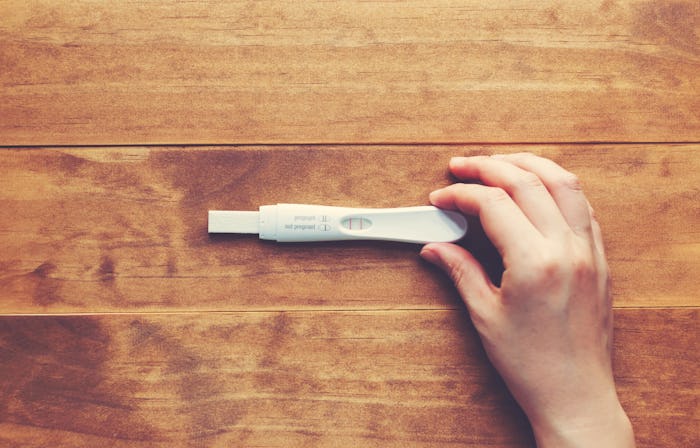Life

Don't Test Too Early — Here's When You Should *Really* Take A Pregnancy Test
That pink-and-white stick has been gathering dust in the bathroom cabinet for ages, and now you're finally ready to use it. Scary? A little. Exciting? For sure. If you've missed a period — or something just feels off — you're probably wondering, when should I take a pregnancy test? After all, those tests don't come cheap, and no one needs the stress of a false negative.
You've probably seen the tests claiming to detect pregnancy well in advance of a missed period, but there's something you need to keep in mind — pregnancy tests are products people are trying to sell. Don't fall for the claims. As Dr. Marcy Maguire of the Reproductive Medicine Associates of New Jersey (RMANJ) explained in an email to Romper, a pregnancy test is best performed the day after a missed period — period. And you can plan to take that test as soon as you wake up. "The best time of day to take a home pregnancy test is first thing in the morning because your urine is the most concentrated, thus making human chorionic gonadotropin (hCG) levels easier to test," Josie Bouchier of Holistic Health for The Whole Woman and an expert at The Tot tells Romper.
What's the big deal with hCG? According to Healthline, the only time you'll detect the hormone is when you're pregnant. "Be sure to check the instructions on each individual brand to know how many days before your expected period you can accurately test, as it varies depending on the sensitivity of the test," Bouchier explains.
So ignore the pink wrapper proclaiming test accuracy six days before a missed period and not just because the science is fuzzy. For Bouchier, it's not worth the stress and tears (or that package of Twizzlers you never meant to eat). "Sometimes women will start testing too early," she explains, "which sends them on an emotional roller coaster for several days every month. This can be emotionally exhausting and add unnecessary stress (and expense) to the process of trying to conceive."
Maguire agrees. "Tests performed prior to the first day of missed menses are less accurate and may provide false negative results. If a woman suspects that she is pregnant but has a negative urine pregnancy test, she should repeat the urine pregnancy test in a week," she says. "Alternatively, she may have her blood drawn to test for pregnancy. Blood (serum) pregnancy levels are much more accurate."
Bouchier encourages patients to get in touch with their bodies by following the Fertility Awareness Method, which you can find detailed on Planned Parenthood's website. This method teaches women to "record their basal body temperatures every morning." Once a pattern becomes clear (and that may take a few weeks of careful temperature recording), you'll be able to tell when you're pregnant without spending bucks on a test.
"The most common cause of a false negative urine pregnancy test is performing the test too early," writes Maguire. "On rare occasions, very high pregnancy hormone levels can also cause false negative results."
It's never easy to wait for the results of a pregnancy test, whether you're trying to conceive or hoping you're still baby free. If you want to be proactive, however, don't just purchase a passel of sticks. Try taking your temperature and recording it each day, or, for the very not-squeamish, getting in touch with your cervical mucus. When it's time to verify your suspicions (remember, the first day after your missed period is your magic day), be sure to collect your urine first thing in the morning, when your hCG hormone is most concentrated. Then cross your fingers, ask Alexa to play your favorite song, and with your heart thumping, check your results. Good luck.
Check out Romper's new video series, Romper's Doula Diaries:
Check out the entire Romper's Doula Diaries series and other videos on Facebook and the Bustle app across Apple TV, Roku, and Amazon Fire TV.